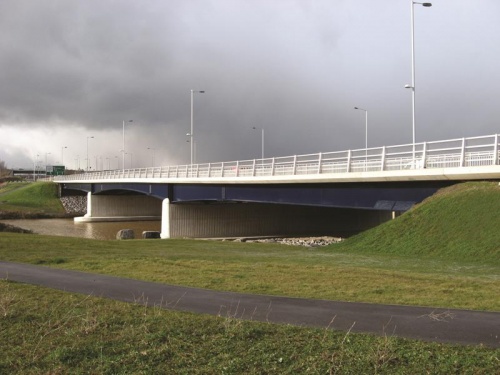Difference between revisions of "A66 Surtees Bridge Replacement"
| Line 1: | Line 1: | ||
| − | {{#image_template:image=File:A66_Surtees_Bridge_Replacement.jpg|caption=''(Image courtesy of [http://www. | + | {{#image_template:image=File:A66_Surtees_Bridge_Replacement.jpg|caption=''(Image courtesy of [http://www.tatasteelconstruction.com Tata Steel])''|align=right|wrap=true|width=500}} |
The old 5-span bridge carrying the A66 dual carriageway over the River Tees at Stockton was assessed in 2004 and found wanting in several areas. It was not strong enough to take the latest 40t trucks, nor wide enough to accommodate additional traffic from a new link road, and the substructures were deteriorating. Hence, in 2006, construction started on a replacement bridge. | The old 5-span bridge carrying the A66 dual carriageway over the River Tees at Stockton was assessed in 2004 and found wanting in several areas. It was not strong enough to take the latest 40t trucks, nor wide enough to accommodate additional traffic from a new link road, and the substructures were deteriorating. Hence, in 2006, construction started on a replacement bridge. | ||
Revision as of 12:00, 12 March 2019
The old 5-span bridge carrying the A66 dual carriageway over the River Tees at Stockton was assessed in 2004 and found wanting in several areas. It was not strong enough to take the latest 40t trucks, nor wide enough to accommodate additional traffic from a new link road, and the substructures were deteriorating. Hence, in 2006, construction started on a replacement bridge.
The new 145m long three-span bridge has a steel composite deck with nine parallel haunched plate girders fabricated from S355J2 steel to EN 10025-2[1] and a total steel weight of 1936t. It was built in two phases to keep traffic on the A66 moving, with four girders being erected in phase one to replace the southern half of the old bridge, and five girders in phase two to replace the northern half. The bridge was opened to traffic in December 2007.
The 145m long main girders were erected in three sections. 57m long end span and cantilever girders were fabricated at Cleveland Bridge’s facility at Darlington, then assembled into braced pairs and fitted with Omnia planks for the concrete slab. Transportation of these 7.6m wide sections the 20km to the bridge site was carried out at night to minimize traffic disruption. Once at the site, the 163.2t sections were erected from each bank, and the middle sections lowered in to complete the bridge using a 1200t capacity crane.
| Structural engineer | A-one Integrated Highway Services |
| Steelwork contractor | Cleveland Bridge UK Ltd. |
| Main contractor | Edmund Nuttall Ltd. |
| Client | Highways Agency |
References
- ↑ BS EN 10025-2: 2004, Hot rolled products of structural steels, Part 2: Technical delivery conditions for non-alloy structural steels, BSI




